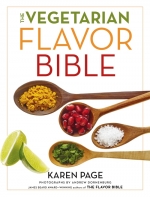Book Review: The Vegetarian Flavor Bible
 This is one in a series of book reviews. You may find any of the books I review of benefit if you: manage prediabetes or diabetes, follow a diabetes meal plan and/or aim to eat healthy to live well. This book and others I’ve reviewed can be found in my amazon a-store. Check them out and consider a purchase.
This is one in a series of book reviews. You may find any of the books I review of benefit if you: manage prediabetes or diabetes, follow a diabetes meal plan and/or aim to eat healthy to live well. This book and others I’ve reviewed can be found in my amazon a-store. Check them out and consider a purchase.
Back about a month ago I got a request from Karen Page, author of The Vegetarian Flavor Bible, asking if I’d review a copy of her new book for twin purposes. One, to help her roll out her new masterpiece (my words, not Karen's). And two, to celebrate the Academy of Nutrition and Dietetic’s National Nutrition Month. I agreed, as did other many other leading dietitians. Check out this month of celebratory blogs for The Vegetarian Flavor Bible.
Great I thought a new vegetarian cookbook to build to my collection and a new resource for healthy vegetarian recipes to add to my repertoire for family dinners and entertaining.
A few days later the book arrived. I quickly discovered that the book is not a cookbook. In fact, there are no recipes. But, the pages are filled with oh so much more!
What I find particularly interesting about Karen’s background is the road she’s taken to her own preference for plant-based eating. Through her years of eating, cooking and culinary training she’s connected the dots between how Americans are generally eating and the diseases we're suffering and dying from - prediabetes, type 2 diabetes, cardiovascular diseases and certain types of cancer, such as breast and colon cancer.
We’re on the same page (sorry for the pun!). The more I follow and read the research on healthier eating the more I’m convinced to slant towards plants. While not totally vegetarian, most of my breakfast and lunches and at least a few dinners each week are vegetarian. Yes, lots of chopping going on in my kitchen!
In the first hundred pages of The Vegetarian Bible Karen openly discusses her transition to and rationale for becoming vegetarian. She then traces the history of vegetarianism from ~3000 BCE to present. Simply fascinating!
With the backdrop framed, the remaining 400 pages of this book is an A-to-Z encyclopedia of vegetarian ingredients, from almonds and amaranth through  pages of various types of mushrooms to yogurt and zucchini blossoms (maybe I’ll finally do something with those blossoms as our garden grows this summer). For each of these ingredients Page provides key points about each entry including: the season for optimal taste, the ingredient’s flavor notes, nutritional profile and attributes and more. The most valuable content for me is the culinary tips for using the foods or ingredients and the ingredients and flavors that the item blends well with.
pages of various types of mushrooms to yogurt and zucchini blossoms (maybe I’ll finally do something with those blossoms as our garden grows this summer). For each of these ingredients Page provides key points about each entry including: the season for optimal taste, the ingredient’s flavor notes, nutritional profile and attributes and more. The most valuable content for me is the culinary tips for using the foods or ingredients and the ingredients and flavors that the item blends well with.
Karen’s words, and I mean words aplenty, in this just over 500 page hardcover book, are blended with beautiful food photographs by Andrew Dornenburg, who conveniently is Karen’s husband.
This is not Karen Page’s first book. She’s a two-time James Beard Award-winning cookbook author having won one of these awards for the famed The Flavor Bible, based on a similar approach to listing hundreds of ingredients matched with the herbs, spices, and other seasonings that enhance the flavors of these foods.
While this book won’t be a source of new recipes for me, it will sit within my collection of preferred cookbooks (in my kitchen) and be a source for new ingredients to integrate and endless inspiration for flavor combinations as I continue to explore more plant-based eating. That’s perfect because in reality recipes for me are simply a starting point either to be enhanced or simplified depending on time and/or energy.
And I loved turning to the last page in the book and seeing one of my favorite nutrition experts, Dr. David Katz, aptly quoted saying, “The fact is that healthful eating consistently emphasizes the same foods: vegetables, fruits, beans, legumes, nuts, seeds, and whole grains.” Yes, this simple fact is becoming clearer and clearer.
(Note of disclosure: I was provided with a copy of The Vegetarian Bible but was not compensated otherwise for this review.)

